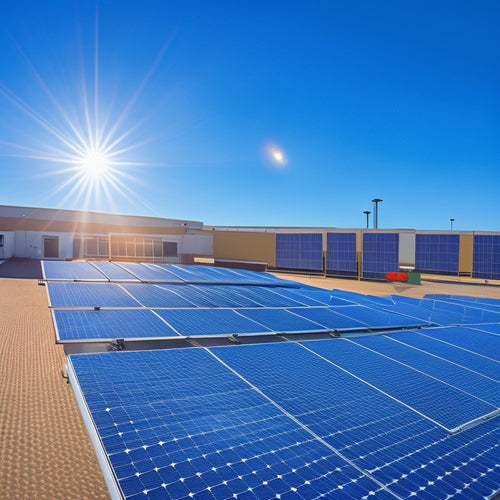
Unlock Home Energy Independence With Smart Storage
Share
By incorporating smart storage solutions into your home's energy ecosystem, you can access the full potential of renewable energy sources, such as solar power, and break free from reliance on the grid. This collaboration enables you to store excess energy generated during the day for later use, reducing waste and optimizing consumption. With advanced energy management capabilities, you can identify areas for efficiency improvements, implement upgrades, and maximize energy savings. As you continue to investigate the world of smart storage, you'll uncover the precise strategies and solutions that can help you achieve a newfound level of energy independence in your home.
Key Takeaways
- Smart storage solutions like Schneider Electric's XW Series enhance energy autonomy and grid resilience, enabling efficient use of renewable energy sources.
- Lithium-ion batteries, like those from SimpliPhi Power, offer high energy density and long lifespan, ideal for home energy storage and grid integration.
- Advanced energy management optimizes energy usage and storage, allowing homeowners to minimize reliance on the grid and reduce energy costs.
- Real-time monitoring and detailed energy audits help identify areas for efficiency improvements, leading to reduced energy consumption and increased autonomy.
- By optimizing energy efficiency and storage, homeowners can disconnect from the grid during peak hours, increasing energy savings and attaining energy independence.
Smart Storage for Renewable Energy
As you shift to renewable energy sources, you're likely generating more electricity than you can consume at the moment. This excess energy can be a blessing in disguise, but only if you have a smart storage system in place.
With solar integration, you can capture the power of the sun and store it for later use. Effective energy management is vital to guarantee that your renewable energy sources are employed efficiently.
By incorporating smart storage into your energy setup, you can optimize your energy consumption, reduce waste, and enjoy a more sustainable lifestyle. Many top solar energy storage solutions, such as Schneider Electric's XW Series, prioritize energy autonomy, grid resilience, and renewable integration.
Home Battery Options Explained
Frequently, homeowners evaluating renewable energy solutions face an essential decision: choosing the right home battery option.
You'll want to examine lithium technology, which offers high energy density and a long lifespan. Lithium-ion batteries are the most popular choice for home energy storage due to their high efficiency and compact design.
When selecting a battery, think about grid integration – how seamlessly the battery will work with your grid connection. Top-rated solar battery systems, such as those from SimpliPhi Power, are recognized for their high-performance and reliability.
Look for batteries with advanced grid integration capabilities, allowing you to optimize your energy usage and feed excess energy back into the grid. This will maximize your energy independence and savings.
Powering Your Home Independently
You've chosen a high-performance home battery system that seamlessly integrates with your grid connection. This enables you to tap into off-grid solutions, allowing your home to operate independently during power outages or when the grid is unreliable.
With advanced energy management capabilities, your system optimizes energy usage and storage, ensuring a steady supply of power to your home. By leveraging real-time monitoring, you can identify high usage areas and lower your energy bills.
Additionally, this setup provides a reliable and efficient means of powering your home independently, reducing your reliance on the grid and minimizing your energy bills.
During the day, your solar panels or other renewable energy sources charge your battery, and at night or during outages, the battery discharges to power your home. This setup provides a reliable and efficient means of powering your home independently, reducing your reliance on the grid and minimizing your energy bills.
Maximizing Energy Efficiency Gains
Your high-performance home battery system's advanced energy management capabilities are designed to optimize energy usage and storage, ensuring a steady supply of power to your home.
This sophisticated technology allows you to maximize energy efficiency gains by pinpointing areas of improvement through detailed energy audits.
With this data, you can identify opportunities for efficiency upgrades, such as sealing air leaks or upgrading to energy-efficient appliances.
By implementing these upgrades, you'll reduce your energy consumption and reliance on the grid, allowing your home battery system to store excess energy generated by your solar panels or wind turbines.
This collaboration between energy efficiency and smart storage enables you to achieve unparalleled energy independence.
Energy Autonomy Made Simple
By the time you've optimized your energy efficiency and maximized your energy storage, achieving energy autonomy becomes a much more attainable goal.
You've reduced your energy consumption and can now rely on your stored energy reserves to power your home. This means you can disconnect from the grid during peak hours, reducing your reliance on grid alternatives and increasing your energy savings.
With smart storage, you can seamlessly switch between grid power and stored energy, ensuring a stable and efficient supply.
As a result, you'll enjoy greater control over your energy usage, reduced energy costs, and a significant step towards energy autonomy.
Frequently Asked Questions
Can I Use Smart Storage With My Existing Solar Panel System?
You can definitely use smart storage with your existing solar panel system, ensuring solar panel compatibility and activating smart storage benefits like optimized energy usage, reduced grid reliance, and increased savings.
How Long Does It Take to Install a Home Battery System?
When you decide to install a home battery system, you'll typically spend 1-3 days on the installation process, depending on the complexity and battery capacity, with a trained team working efficiently to get you up and running.
Are There Any Government Incentives for Energy Storage Systems?
You'll be thrilled to know that you're eligible for federal tax credits, local rebates, and incentives promoting energy efficiency, which can considerably offset storage technologies' installation costs, making financing options more accessible and affordable for you.
Can Smart Storage Systems Be Monitored and Controlled Remotely?
You can remotely monitor and control your smart storage system, leveraging remote monitoring capabilities to optimize energy management, track performance, and receive alerts, allowing you to make informed decisions about your energy usage and storage needs.
Are Energy Storage Systems Compatible With Grid-Tied Systems?
You'll find that most energy storage systems are compatible with grid-tied systems, but you'll need to maneuver energy storage compatibility and address potential grid integration challenges to guarantee seamless operation and ideal performance.
Related Posts
-

Net Metering in Renewable Energy's Future
Net metering's future is vital for driving renewable energy growth and financial savings. You can reduce your electri...
-

Renewable Energy Solutions to Reduce Your Carbon Footprint
To reduce your carbon footprint, adopting renewable energy solutions is key. Using solar panels or wind turbines can ...
-

Essential Solar Panel Mounts for Commercial Properties
When it comes to essential solar panel mounts for your commercial property, durability and wind resistance are key fa...


